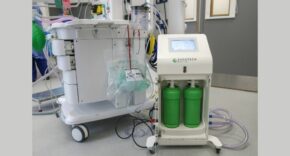
Artificial Intelligence (AI) is reducing the administrative burden at Europe’s largest and fastest-growing digital-first healthcare provider, Kry. In the past year, its AI programs have reduced the time spent on administrative tasks by 40 percent, transcribing up to 18,000 patient appointments weekly across its clinics and within its digital appointment setting. Generative AI at the company simplifies complex, time-consuming administrative and clinical processes, alleviating workplace pressures for clinicians.
The current iteration of AI tools and large language models (LLMs) excels in analysing vast volumes of unstructured data, such as clinical notes and medical records, and can efficiently transcribe doctors’ notes, pre-fill referral letters, and perform other administrative tasks.
Having delivered over 200 million patient interactions to date, Kry (known as Livi in the UK and France) is a highly rated healthcare provider as evidenced by its 4.8 out of 5.0 patient satisfaction rating. The company provides care management in more than 30 spoken languages—from Arabic to Urdu—making care management even more accessible and equitable to a global patient base.
Personalising care
Kry is in a unique position to address the challenges that healthcare systems around the world are facing.
Using its own technology and ecosystem of own and partner clinical services, Kry bridges physical and digital healthcare to effectively navigate its patients to the right care setting and most suitable medium (digital care setting or a physical appointment if needed).
Kalle Conneryd Lundgren, Chief Operating Officer at Kry explains: “New tools and technologies will continually advance healthcare. However, the most substantial social and economic gains lie in the potential of data and AI unlocking unprecedented efficiency and optimisation, benefiting patients, healthcare professionals, and providers alike.”
At Kry over 750,000 patients to date have experienced AI charting. The AI provides robust information management, enabling clinicians to remain at the helm, while the tool tackles administrative heavy tasks.
This collaboration between tech and clinician fosters confidence and enhances the integration of AI technology. Using Azure Open AI, AI’s capability to draft medical notes and prompts, enhances patient needs analysis, particularly in managing chronic diseases and multi-morbid conditions.
For example, by supporting clinicians in identifying and prompting suitable diagnosis codes that are then reviewed and set by the clinician for the patient. So far at Kry, more than 700,000 international classification of diseases (ICD) code suggestions have been generated, meaning the clinician diagnoses the patient and the tool looks up the relevant code. This reduces the time spent on the manual input of diagnosis codes thereby improving efficiency.
Because of its unique operating model, Kry can send the right patients to its digital service thereby increasing capacity and achieving unprecedented efficiency and capacity with more than 4-6 consultations per hour.
Kalle continues: “We’re at the forefront of something special at Kry to really deliver what is needed for healthcare of the future, with AI playing a key role in boosting efficiency by offloading our physical health enters.”
Patients aren’t the only ones to benefit. It is estimated that a European physician’s working time is roughly split 50-50 between treating patients and administrative tasks1. However, it has been forecast with the implementation of AI technologies in healthcare, physicians would be able to spend 17 percent more of their time on patients because the time burden of administrative tasks would be reduced.
A British Medical Association survey of trainee GPs found that 70 percent were experiencing burnout and stress, primarily due to the overwhelming paperwork. Addressing this burnout is essential for retaining valuable medical staff and ensuring high standards of patient care.
“The healthcare sector has long grappled with issues such as staff shortages, prolonged waiting times, and operational inefficiencies from unstructured tech and multiple systems. The adoption of AI technology is not about replacing medical practitioners but rather optimising the healthcare environment for the benefit of patients, clinicians, and providers alike.”
- https://www.statista.com/statistics/1202254/time-ai-could-save-in-healthcare-administration-europe/











